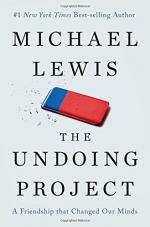
|
| Name: _________________________ | Period: ___________________ |
This test consists of 15 multiple choice questions and 5 short answer questions.
Multiple Choice Questions
1. Which mathematician had published the major theory of decision-making when Tversky and Kahneman started researching it?
(a) Jonathan Keynes.
(b) Daniel Bernoulli.
(c) Harold Bayes.
(d) Leonardo DaVinci.
2. In Chapter 8, what was the hospital Donald Redelmeier worked at known for?
(a) Treating heart attacks.
(b) Treating victims of car accidents.
(c) Treating mental health issues.
(d) Treating bone injuries.
3. What did Tversky like to do in the summer of 1970 as he talked through some ideas with friends?
(a) Play hockey.
(b) Play soccer.
(c) Play video games.
(d) Shoot baskets.
4. Where were the leaders in decision analysis clustered in the early 1970s?
(a) The Stanford Research Institute.
(b) The Sorbonne.
(c) Oxford and Cambridge.
(d) Harvard Medical School.
5. In Chapter 9, what did Kahneman say people needed in order to make a decision rather than a number?
(a) A soul.
(b) A story.
(c) A conscience.
(d) A heart.
6. What was Goldberg's paper about medical judgement that Lewis mentions in Chapter 6 titled?
(a) Man versus Model of Man.
(b) The Expert Fallacy.
(c) Miracles of Misadventures in Medicine.
(d) The Judgement Papers.
7. In Chapter 9, what did Tversky and Kahneman briefly focus on once they despaired of changing adult minds about decision-making mistakes?
(a) Programs for elementary-aged children.
(b) Cartoon programs to help teach children about decision-making mistakes.
(c) Fictional books to help teach children about flaws in logical processes.
(d) College courses to help train parents to teach their children about flaws in decision-making processes.
8. In Chapter 9, what does Lewis say Kahneman's and Tversky's relationship was like in every way other than sexually?
(a) Parents and children.
(b) Lovers.
(c) Cousins.
(d) Siblings.
9. Who was the engineer for the World Trade Center project?
(a) Les Robertson.
(b) Marcus Samuelson.
(c) Thomas Colhard.
(d) Rachel Adams.
10. Where did Kahneman fly to meet Anne Treisman and declare her love for her in 1975?
(a) London.
(b) Columbia.
(c) New York.
(d) Rome.
11. Where did Tversky and Kahneman first go during the war in 1973 in the field?
(a) Syria.
(b) Jordan.
(c) Tel Aviv.
(d) The Sinai.
12. What did Redelmeier struggle with as a child?
(a) Blindness.
(b) A speech impediment.
(c) Polio.
(d) Eczema.
13. How did Kahneman change the way tank drivers were trained?
(a) He said they would learn best in pairs.
(b) He said they would learn best in trios.
(c) He said they would learn best by taking notes.
(d) He said they would learn best in bursts of 30-minute intervals.
14. Kahneman felt that it was the anticipation of which of the following that affected many people's decisions?
(a) Contentment.
(b) Regret.
(c) Anger.
(d) Embarrassment.
15. Where did Tversky spend the 1970-71 academic year?
(a) Stanford University.
(b) Yale University.
(c) Harvard University.
(d) Princeton University.
Short Answer Questions
1. What was Barbara Tversky doing when the war broke out in Israel in 1973?
2. What did one Hebrew University official say to Tversky about him leaving Israel for the United States?
3. What did Tversky like to call good ideas?
4. What publication did Tversky and Kahneman think offered them the best chance of reaching audiences outside of psychology?
5. What kind of opinion did Tversky have about historians and history books?
|
This section contains 574 words (approx. 2 pages at 300 words per page) |

|




